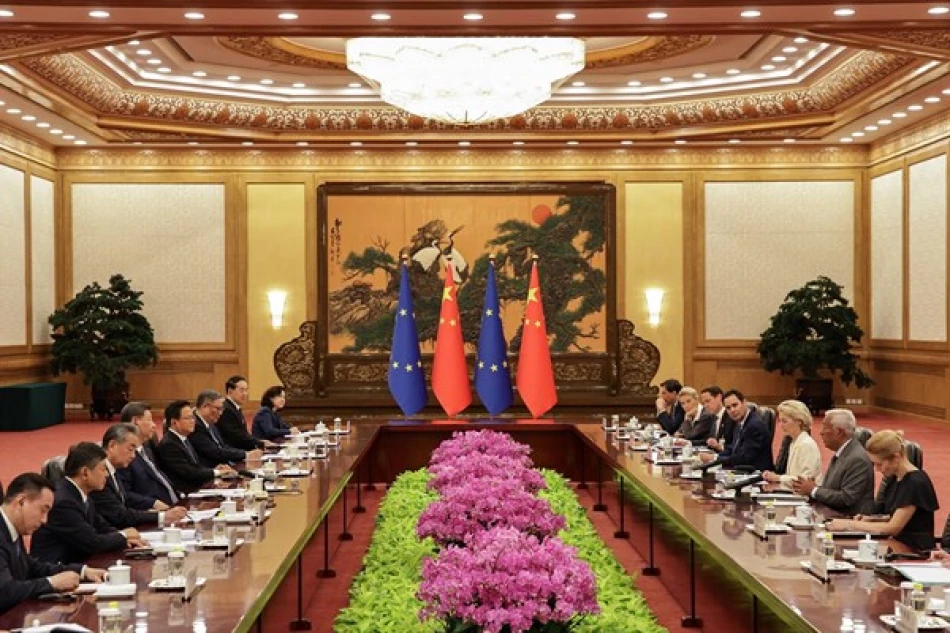
China and EU Leaders Convene High-Level Summit in Beijing
Xi Jinping Calls for "Strategic Choice" as China-EU Relations Enter Critical Phase
Chinese President Xi Jinping met with top European Union leaders in Beijing Thursday, urging both sides to make the "right strategic choice" amid mounting tensions over trade disputes and diverging positions on the Ukraine crisis. The high-stakes summit between Xi and EU leaders António Costa and Ursula von der Leyen signals a pivotal moment for the world's two largest trading blocs as they navigate increasingly complex geopolitical waters.
A Summit at the Crossroads
The meeting brought together Xi with European Council President António Costa and European Commission President Ursula von der Leyen, covering a broad agenda spanning trade relations and the ongoing conflict in Ukraine. According to China's official Xinhua news agency, the discussions come at a time when both sides face pressure to redefine their relationship amid global uncertainty.
"Chinese and European leaders must once again demonstrate vision and commitment, and make the right strategic choice that meets people's expectations and stands the test of history," Xi told his European counterparts, according to a statement from China's Foreign Ministry.
Economic Stakes Run High
The timing of this diplomatic engagement reflects the enormous economic interests at play. China-EU trade reached over €800 billion in 2023, making them each other's second-largest trading partners. However, this relationship has grown increasingly strained over European concerns about Chinese industrial subsidies, market access restrictions, and Beijing's stance on Russia's invasion of Ukraine.
Trade Tensions Escalate
Recent months have seen escalating trade disputes, particularly around electric vehicles and green technology sectors where China has gained significant competitive advantages. The EU has launched investigations into Chinese state subsidies for EVs and solar panels, while Beijing has responded with its own trade measures, creating a tit-for-tat dynamic reminiscent of US-China trade wars during the Trump administration.
Geopolitical Calculations
Xi's call for a "strategic choice" comes as both sides recalibrate their positions in an increasingly multipolar world. For China, maintaining strong economic ties with Europe provides crucial diversification away from an increasingly hostile US relationship. For the EU, balancing economic interests with security concerns about China's growing influence represents one of the bloc's most challenging diplomatic puzzles.
The Ukraine Factor
China's relationship with Russia and its position on the Ukraine conflict remains a significant point of contention. While Beijing has avoided directly supporting Moscow's military campaign, its continued economic ties with Russia and refusal to condemn the invasion have created friction with European partners who view the conflict as an existential threat to the international order.
Market Implications and Investor Outlook
For global markets, the outcome of China-EU relations carries substantial weight. European companies with significant China exposure, from luxury goods manufacturers to automotive giants, closely watch diplomatic developments that could impact market access and regulatory environments. Similarly, Chinese firms seeking European investment and technology partnerships face increasing scrutiny and potential restrictions.
The semiconductor and technology sectors remain particularly sensitive, as both sides seek to reduce strategic dependencies while maintaining profitable commercial relationships. This balancing act mirrors similar challenges faced by other major economies, including Japan and South Korea, as they navigate between economic pragmatism and security concerns.
Historical Context and Future Trajectory
Xi's emphasis on choices that "stand the test of history" reflects China's longer-term strategic thinking, contrasting with what Beijing often characterizes as short-sighted Western policies. This summit occurs against the backdrop of China's broader diplomatic push to strengthen ties with Global South nations while managing relationships with traditional Western powers.
The meeting's outcome will likely influence broader global trade patterns and alliance structures, particularly as the EU continues developing its "strategic autonomy" doctrine aimed at reducing dependencies on both China and the United States in critical sectors.
Most Viewed News

 Layla Al Mansoori
Layla Al Mansoori






